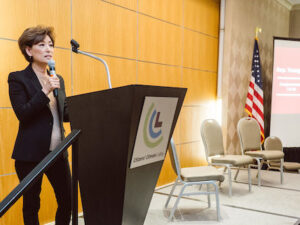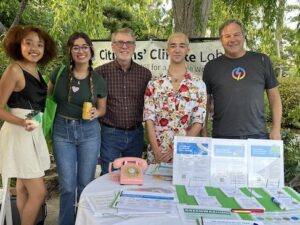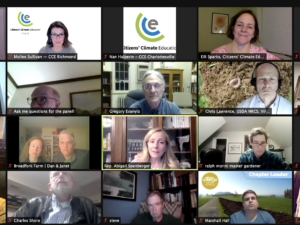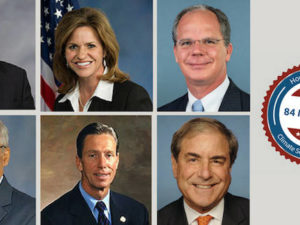FOR IMMEDIATE RELEASE

Virginia economists call for a carbon price
VIRGINIA, Jan. 25, 2022 – Citizens’ Climate Lobby volunteers in Virginia have organized a statement from 35 economists across the state. The economists outline the value of a carbon fee and dividend policy for the climate, for people’s health, and for households’ economic benefit. See the full statement and the signatories below.
Climate change is one of the greatest challenges of our generation. As global average temperatures have increased 1°C (1.8° F) over the last 100 years, extreme weather events and wildfires have grown rapidly. The cost of this destructive weather is rising dramatically: according to NOAA, climate and weather-related disasters now regularly cost the US over $100 billion per year, a more than 5-fold increase from the 1980s, on an inflation-adjusted basis. In Virginia, billions of dollars in housing and military facilities in the Hampton Roads region are threatened by climate-driven sea level rise, and agriculture faces growing risks of crop losses.
If global carbon emissions stay on their current path, the temperature increase will at least triple by the end of this century, and corresponding damages will increase even more. As the IMF recently stated, “Without further action to reduce greenhouse gas emissions, the planet is on course to reach temperatures not seen in millions of years, with potentially catastrophic implications.”
There is a simple, effective solution, broadly favored by economists, that will stabilize climate risk, and increase both GDP and job opportunities. The largest public statement of economists in history, signed by all living Chairs of the Federal Reserve, 28 Nobel Laureates, and over 3500 other economists, advocates a policy wherein a fee is put on carbon dioxide emissions and all funds raised are returned directly to households. This solution, commonly referred to as carbon fee and dividend, is favored because it “offers the most cost-effective lever to reduce carbon emissions at the scale and speed that is necessary” [1]. By providing a financial incentive to all consumers and producers, it “will send a powerful price signal that harnesses the invisible hand of the marketplace to steer economic actors towards a low-carbon future” [1].
Because this policy allows consumers and producers the flexibility to reduce emissions in the ways that are best for them, reductions are achieved at least-cost, and this is better for the economy. In fact, the same IMF report shows that a strong carbon fee and dividend policy will increase GDP somewhat in the near-term and improve it dramatically in future decades, as tremendous climate-related damages to the economy are avoided. Further, they state that this type of market-based policy will have a net positive effect on employment.
The policy that works for carbon dioxide works as well for methane and other climate-warming gasses. As carbon dioxide and these other gasses are reduced and climate risk stabilized, the policy greatly improves our health and saves tens of thousands of lives each year.
Finally, this approach provides a financial benefit to the poor. Simply by charging a fee corresponding to the harm from emissions of climate-warming gasses and returning all the funds collected to the American people, “The majority of American families, including the most vulnerable, will benefit financially by receiving more in ‘carbon dividends’ than they pay in increased energy prices” [1].
We agree: a carbon fee and dividend policy is a clear win-win for America. We can stabilize climate risk, improve the economy, increase job opportunities in the industries of the future, improve our health and help the most vulnerable, all with one policy. The time to tackle climate change is now, and carbon fee and dividend should be the centerpiece of how we do it.
[1] “Economists’ Statement on Carbon Dividends” Climate Leadership Council. (accessed 11 Jun 2021).
Samuel Allen
Virginia Military Institute
Jeffrey Alwang
Virginia Tech
Elinor Benami
Virginia Tech
James Bennett
George Mason University
Darrell Bosch
Virginia Tech
Rik Chakraborti
Christopher Newport University
Caleb Cox
Virginia Commonwealth University
Amy Diduch
Mary Baldwin University
Timothy Diette
Washington and Lee University
Mike Ellerbrock
Virginia Tech
John Gunn
Washington and Lee University
Timothy Hamilton
University of Richmond
James Harrigan
University of Virginia
Christopher Herrington
Virginia Commonwealth University
Derek Horstmeyer
George Mason University
Andrew Kohen
James Madison University
Oleg Korenok
Virginia Commonwealth University
Anton Korinek
University of Virginia
Matthew Kovach
Virginia Tech
James Leaman
Eastern Mennonite University
Daniel Murphy
University of Virginia Darden School of Business
Evelyn Nunes
Virginia Commonwealth University
Ed Olsen
University of Virginia
Alfredo Pereira
William & Mary
Christopher Ruhm
University of Virginia
Djavad Salehi-Isfahani
Virginia Tech
George Santopietro
Radford University
Alec Smith
Virginia Tech
Aris Spanos
Virginia Tech
Sarah Stafford
William & Mary
Leslie Stratton
Virginia Commonwealth University
Sandip Sukhtankar
University of Virginia
Nathaniel Throckmorton
William & Mary
Nicolaus Tideman
Virginia Tech
Jonathan Wight
University of Richmond





